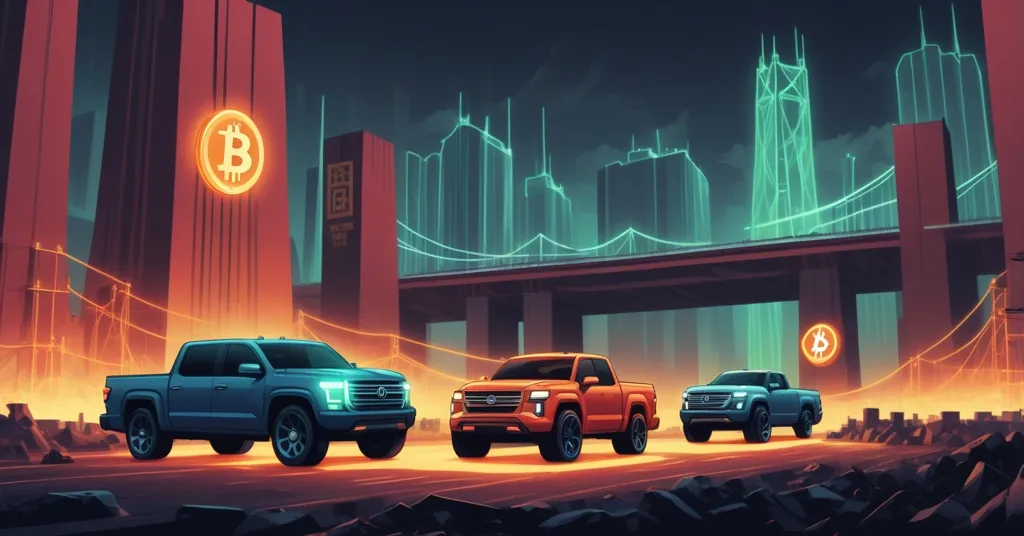Trump Slams Japan Auto Trade, Tariffs Hit Hard, Blockchain Offers Crypto Fix

Trump Targets Japan’s Auto Trade as Unfair: Tariffs Loom and Decentralized Solutions Beckon
President Donald Trump has reignited a long-simmering feud with Japan, slamming their automobile trade practices as blatantly unfair in a recent fiery interview. With a critical July 9 deadline fast approaching for broader tariff hikes, a 25% tariff on Japanese car imports—already in place since April 3, 2025—threatens to escalate tensions into a full-blown trade war, impacting consumer prices, global markets, and economic stability. Yet, beneath the surface of this centralized economic clash, could Bitcoin and blockchain technology offer a disruptive way forward?
- Trade Disparity: Japan exports 1.37 million cars annually to the US, while American cars barely register in Japan’s market.
- Tariff Pressure: A 25% tariff on Japanese autos is active, with broader hikes of 10-24% possible by July 9 if no deal emerges.
- Decentralized Potential: Blockchain and crypto could mitigate trade war fallout, offering alternatives to fragile fiat systems.
The Stark Imbalance in US-Japan Auto Trade
Trump’s frustration boils down to numbers that don’t lie: Japan ships around 1.37 million vehicles to the US each year, contributing to a staggering $59.4 billion trade surplus, while American automakers struggle to sell even a fraction of that in Japan. That surplus, for those unfamiliar, means Japan sells far more to the US than it buys back, a gap that’s been a thorn in the side of American policymakers for decades. “So we give Japan no cars. They won’t take our cars, right? And yet we take millions and millions of their cars into the United States. It’s not fair,” Trump declared, capturing a sentiment that resonates with anyone eyeing the lopsided trade statistics.
“So we give Japan no cars. They won’t take our cars, right? And yet we take millions and millions of their cars into the United States. It’s not fair.” – Donald Trump
The root of this imbalance isn’t just raw volume—it’s the invisible wall of red tape known as non-tariff barriers. For newcomers to trade jargon, these aren’t direct taxes but regulations like Japan’s ultra-strict safety and emissions standards that make compliance a nightmare for foreign cars. Add to that a cultural loyalty to domestic brands like Toyota and Honda, plus a dealer network that’s near-impossible for outsiders to crack, and you’ve got a market that’s effectively locked shut. Even though Japan technically has a zero-tariff policy on car imports, American vehicles—often bulkier, less fuel-efficient, and built for left-hand drive—rarely fit the mold or appeal to Japanese buyers. Trying to sell a gas-guzzling pickup in Tokyo is like pitching Bitcoin to a traditional bank CEO: good luck bridging that cultural chasm, especially given the historical challenges with safety and emissions compliance.
Tariff Threats and the July 9 Countdown
The stakes are sky-high with a 25% tariff on Japanese auto imports already biting since early April 2025. If no comprehensive trade deal materializes by July 9, broader US tariff increases of 10% to 24% across various sectors could pile on, dealing a brutal blow to an industry that accounts for 82% of Japan’s trade surplus with the US. Analysts estimate this could cost Japanese automakers up to $17 billion in lost market share, potentially tipping Japan’s economy—already shaky after a contraction in the first quarter of 2025—into a deeper downturn. For American consumers, the fallout is simpler but no less painful: expect to shell out more for that next sedan or hybrid as import costs ripple through dealerships, a concern echoed in discussions about tariff impacts on US buyers.
Negotiations are in full swing, with Japan’s chief negotiator Ryosei Akazawa and US Commerce Secretary Howard Lutnick trading diplomatic niceties, calling their talks “productive” and “fruitful.” Their joint statement pledges to “continue seeking a deal that benefits both the US and Japan.” But let’s slice through the polite smokescreen—insider reports suggest no real headway on the big issues: how to fairly measure market access for American cars in Japan and how to shrink that gaping trade deficit. Akazawa camping out longer in Washington isn’t a sign of breakthroughs; it’s a flashing neon sign of desperation as the clock winds down, especially with the July 9 deadline looming large.
“Continue seeking a deal that benefits both the US and Japan.” – Joint statement from Ryosei Akazawa and Howard Lutnick
Japan’s Side: More Than Meets the Eye
Before we paint Japan as the sole bad guy in Trump’s trade drama, let’s flip the script. Japanese automakers aren’t just flooding the US with cars—they’re woven into the American economic fabric. They churn out 3.3 million vehicles annually on US soil, more than double their direct exports, while pumping over $60 billion into investments and sustaining 2.3 million jobs. That’s not a trivial footnote; it’s a counterpunch to the “America First” narrative of pure exploitation. Trump’s gripe that Japan “won’t take” US cars also glosses over their zero-tariff policy—the real hurdle isn’t malicious intent but a market mismatch. A beefy Ford F-150 might rule rural America, but it’s a logistical disaster on Japan’s narrow streets, a dynamic explored in broader US-Japan trade relations.
Moreover, tariffs aren’t a magic fix. They could boomerang, hitting American workers at Japanese-owned plants hardest if production slows or shifts overseas. Think of it like overregulating crypto exchanges—you might aim to control the market, but you risk choking innovation and jobs instead. Japan’s already mulling pivots, coordinating with South Korea and China to counter US tariffs or ramping up production in other markets like Southeast Asia. These shifts could jack up costs across global supply chains, from raw materials to EV battery components, exposing just how brittle centralized trade systems can be, a reality underscored by the heavy toll on Japan’s auto sector.
Trump’s Playbook: Leverage or Chaos?
Trump’s tariff gambit is ripped straight from his broader trade war manual—wield tariffs like a blunt weapon to force concessions, collateral damage be damned. We’ve seen this with China and the EU, where unilateral threats often drag partners to the table but fracture global trade norms in the process. History offers a mixed bag: back in the 1980s, US quotas on Japanese autos pushed some manufacturing stateside, but they didn’t fully balance the trade ledger and often spiked consumer costs. Today’s approach, with Trump drafting letters to slap tariffs without further consultation, risks alienating a key ally at a time when geopolitical stability is already on thin ice, sparking debates across platforms like Reddit over tariff impacts.
The bigger question is whether this centralized strong-arming can even survive in a world trending toward decentralization. Trade wars lay bare the flaws of fiat-driven economies—currency swings and policy whims hit exporters hard, and consumers pay the price. Japan’s economy teeters, American buyers face sticker shock, and supply chains wobble. It’s a mess that screams for a system less tethered to governmental chess games, a point where the ethos of Bitcoin and blockchain starts looking less like a niche experiment and more like a lifeline.
Could Decentralized Tech Be the Trade War Fix?
Speaking of lifelines, let’s zoom in on why crypto enthusiasts should care about this spat. Trade disputes like this one expose the fragility of centralized financial systems—tariffs inflate costs, devalue currencies, and disrupt markets overnight. But what if Japanese firms could settle deals in stablecoins, cryptocurrencies pegged to assets like the US dollar, dodging fiat fluctuations driven by policy spats? Or imagine Ethereum-based smart contracts automating trade agreements, ensuring transparency and cutting out slow, tariff-laden middlemen. These aren’t pipe dreams; they’re the kind of disruptions blockchain was built for, as highlighted in discussions on blockchain’s role in resolving trade disputes.
Bitcoin, as the ultimate store of value, offers a neutral, censorship-resistant haven for nations or companies caught in economic crossfire. If Japan’s exporters face a $17 billion hit, holding or transacting in Bitcoin could hedge against a weakening yen tied to trade losses. Altcoins like Ethereum fill niches Bitcoin doesn’t touch, much like how US automakers could target Japan’s market with tailored EVs or luxury rides if they adapted strategically. Decentralized finance (DeFi) platforms could even let firms bypass traditional banking bottlenecks, slashing the cost inflations tariffs bring. It’s not just tech for tech’s sake—it’s a middle finger to the outdated, top-down systems that keep failing us.
Now, don’t get me wrong—crypto isn’t a silver bullet. Adoption at this scale faces hurdles, from regulatory pushback to scalability issues. But in a world where centralized policies keep screwing over the little guy (and the big players too), the case for financial sovereignty grows stronger by the day. Trade wars are just the latest proof that the old guard’s playbook is running out of pages.
Untapped Opportunities and Hard Truths
Back to the trade grind, the US isn’t entirely without leverage or opportunity. There’s untapped potential in Japan for American classic cars, performance vehicles, or electric options like Tesla, if only automakers would tailor their approach instead of banking on forced market openings. It’s a lesson in adaptation over aggression—much like how Bitcoin dominates as a store of value while altcoins carve out utility in specific corners. Tariffs might crack the door, but they won’t build lasting bridges, a point driven home by Trump’s own criticism of Japan’s trade practices.
Meanwhile, Japan’s not sitting idle. Prime Minister Shigeru Ishiba’s readiness to negotiate directly with Trump signals how dire the stakes are, with whispers of government support for affected firms if tariffs stick. A broader realignment could be brewing as Japan eyes other markets or doubles down on US production to skirt the fallout. But every pivot risks ripples—higher costs, strained alliances, and a reminder that centralized economies are a house of cards in crisis mode.
Key Takeaways and Questions for Crypto and Trade Enthusiasts
- What fuels the US-Japan auto trade conflict?
Japan’s 1.37 million annual car exports to the US dwarf American imports, driven by a $59.4 billion trade surplus and non-tariff barriers like strict safety standards. - What’s at stake with the 25% tariff and July 9 deadline?
Active since April, the tariff could escalate with broader hikes by July 9, raising US car prices, risking Japan’s economy, and straining global trade relations. - Do Trump’s tariff threats solve trade imbalances?
They might push talks, but history shows tariffs often disrupt markets more than fix issues, burdening consumers and risking retaliation over lasting balance. - How do Japan’s barriers impact American automakers?
Stringent regulations and cultural brand loyalty create an invisible blockade, making it nearly impossible for US vehicles to compete in Japan’s market. - Can blockchain and cryptocurrency ease trade war pain?
Absolutely—Bitcoin offers a hedge against fiat chaos, while Ethereum smart contracts and stablecoins could streamline trade and bypass tariff-driven costs. - Why should crypto fans care about trade disputes?
These clashes highlight centralized system failures, bolstering Bitcoin’s case for financial sovereignty and blockchain’s potential to rethink global commerce.
As the deadline looms, the US-Japan trade saga isn’t just about cars—it’s a glaring spotlight on the cracks in centralized economic control. Tariffs may be Trump’s weapon of choice, but they’re a blunt tool in a world aching for smarter, freer solutions. Maybe it’s time to stop betting on old-school fixes and start asking if Bitcoin’s promise of borderless, sovereign finance isn’t the real game-changer we’ve been overlooking.



